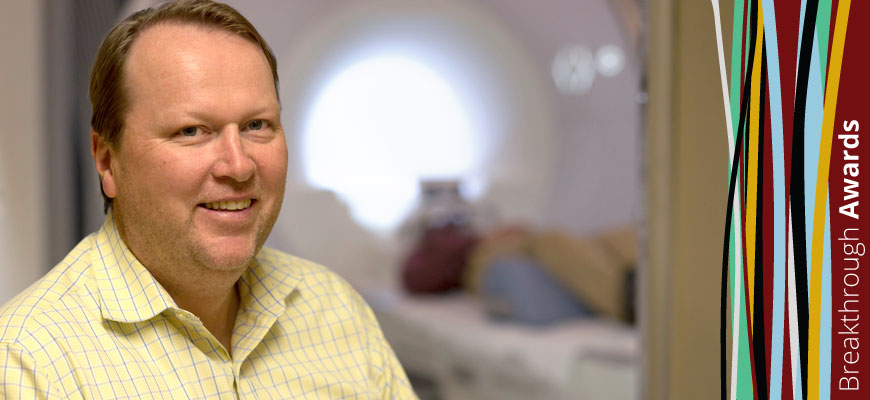
Finding the right words
Public health researcher Julius Fridriksson helps stroke victims recover their words
Posted on: June 2, 2017; Updated on: June 2, 2017
By Craig Brandhorst, CraigB1@mailbox.sc.edu, 803-777-3681
Leadership may be hard to measure, but it’s fairly easy to spot — particularly in academia.
Faculty leaders stand out in their field. They bring in the high-dollar grants. They publish, publish and publish some more. As a result, they’re the ones their peers want to work with, both in their departments and beyond.
For an example, look no further than Julius Fridriksson, director of the University of South Carolina’s Aphasia Laboratory and the SmartState Endowed Chair of Memory and Brain Function.
Since joining the faculty in 2001, Fridriksson has helped bring in more than $20 million in federal grants and is the principal investigator on grants exceeding $16 million, not counting another significant grant currently pending. He has coauthored peer-reviewed publications with 16 different UofSC faculty members and with researchers at other institutions, including MUSC and Johns Hopkins University.
Housed in the Arnold School of Public Health, Fridriksson’s aphasia lab serves as a hub for a range of large-scale studies on the devastating communication disorder, which results from damage to the left side of the brain due to stroke. According to the National Institute on Neurological Disorders and Stroke, it affects approximately one million people in the United States.
“The chief complaint that we get from people with aphasia is that they know what they want to say; they just can’t get the words out,” says Fridriksson. “A family member will say, ‘Well, he’s lost his memory.’ No, he can remember that this is a magazine or that’s a chair; he just can’t remember the word for magazine or for chair. In most people those words are still intact; the person just cannot pull them out.”
Indeed, Fridriksson’s most direct contribution to his field may be that felt by these stroke survivors and their families here in South Carolina.
A family member will say, ‘Well, he’s lost his memory.’ No, he can remember that this is a magazine or that’s a chair; he just can’t remember the word for magazine or for chair.
Julius Fridriksson
In 2002, Fridriksson started the first support group at UofSC for persons with communication problems as a result of stroke. The program, which hosts support group meetings every Friday, provides stroke survivors free behavioral therapy to improve their ability to communicate and invaluable support from their peers.
“In the past, most chronic stroke patients with aphasia have experienced limited recovery and have been assumed ‘fixed’ in state by 28 weeks post-trauma,” says Thomas Chandler, dean of the Arnold School of Public Health. “But Dr. Fridriksson’s research offers great hope for these stroke victims as he has discovered new ways to improve chronic recovery of motor and speech function even 10 or more years after stroke.”
And the new Center for the Study of Aphasia Recovery, spearheaded by Fridriksson’s lab, has opened up even further opportunities for stroke survivors to receive treatment, free of charge.
“Stroke is a major public health problem in South Carolina and access to free care among stroke survivors is almost non-existent,” says Fridriksson. “As such, our groups have benefited a population of South Carolinians who have nowhere else to turn.”